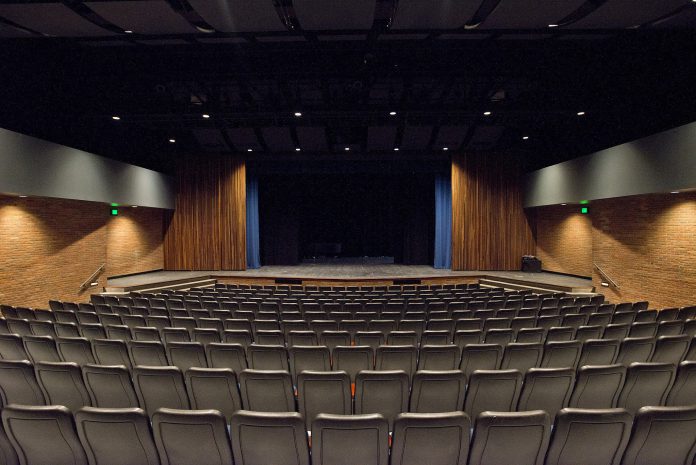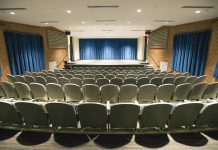
Much like all other aspects of our lives, COVID-19 has drastically changed local theatre as we have always known it. Because of regulations put in place to stop the spread of COVID-19, KCC’s theatre program has seemingly screeched to a sudden halt. Luckily, despite these personal, functional and economical changes in the arts, nothing can truly damage the core fundamentals of theatre.
Actor Khaliid Canales-King is among the many who have had to adapt to theatre in its ever-changing formats.
“Since the pandemic started, I would say theatre has found different ways to reach the public. Virtual performances were definitely an adjustment. But I would say people who still have the drive to perform will do it regardless of the circumstances,” Canales-King said.
Some actors, such as Patrick Lucas, even see the positive sides of digital theatre performances and welcome them with open arms.
“The pandemic has done much to hinder our art, but it has also helped to develop it in new ways. Livestreaming was a medium that went nearly unconsidered, and COVID forced it upon us. We have found that not only does it work, but it allows us to reach greater audiences than before and to still leave each performance feeling accomplished,” Lucas said. “My hope is that this will encourage theatre organizations to continue using this medium, in addition to live audiences. This would allow us to expand live theatre to more people, especially those who can’t afford theatre’s often prohibitive prices.”
Despite the pros, these changes as well as the shortage of opportunities to participate in theatre have greatly influenced the choices of many actors, especially those relying on it as a source of income. According to the National Endowment for the Arts’ analysis of American Community Survey data, artists are 3.6 times more likely to be self-employed, employed part-time or have multiple jobs.
Brad Poer, theatre professor and program coordinator at KCC, is uncertain as to just how much the lack of in-person performances has led people away from theatre.
“It’s clear that the sudden gutting of gigs and positions over the past year has driven many actors, directors and technicians to find new careers or pursuits with the audiences having vanished,” Poer said. “How many of those folks come back to theatre (or how many potential artists get swayed into other passions) when this is all said and done remains to be seen.”
From the outside, it may look like theatre has been turned completely upside down — no in-person audiences, no live performances, not even a stage. But according to Poer, many things remain the same.
“The distance has changed. The drive to connect and relate that both the audience and performers share has stayed the same, if not increased,” Poer said.
Actors and directors alike are grateful for this, as theatre is a crucial part of many lives in many different ways.
“Theatre is important because it’s art,” local actress Libby Rapp said. “At the end of the day, everyone needs a way to be creative and express themselves and theatre is a great way to do it. On a local scale, it’s important because it brings everyone together. You meet people from all walks of life and work together to make something.”
According to Rapp, theatre has a special place in many hearts because of the bonds people have formed through it.
“I’m most grateful for the people that I have met through theatre. They are people you will never forget. A lot of my friends are people I’ve done shows with, not to mention I met my fiancé through theatre,” Rapp said.
Canales-King, like many actors, expresses similar feelings toward the impact theatre has had on his life.
“Theater is a necessity. It’s an art form of expression for someone’s personality. Learning new stories and bringing them to life on the stage or on the screen is an experience that I can never get enough of,” Canales-King said.
But while it may lead to increased confidence in oneself and long-lasting bonds, the importance of theatre goes far beyond a personal level.
“Theatre is like travel without having to buy a plane ticket or pack a suitcase. It shows folks what it means to be a part of something bigger than one’s self, and it forces us to look at things from someone else’s point of view,” Poer stated. “Theatre is not the one thing that can bring about world peace or an end to humanity’s struggles and strife, but the element behind theatre — empathy — just might be the thing that saves us all down the line.”
Directors, actors and audience members are all in luck. COVID-19 vaccines continue to roll out and, according to the CDC, new cases have been decreasing. This means that there is a light at the end of the tunnel for those eagerly awaiting to see or be on an in-person stage again.
“As a theatre person, I have to constantly be ready to promote and plug as part of my gig. So with that in mind, I want to make sure everyone is aware that KCC Theatre is currently planning on returning to the Binda Performing Arts Center stage in Fall 2021 with the run of our production of ‘The Wiz,’ ” Poer said.
For those who appreciate theatre from the house seats, the most important thing that can be done is to simply show up and show support for the arts.
“There is never an unimportant role in theatre. Leads move the plot along, but the company holds it together, and without an audience, even a single member, there is no point at all,” Lucas said.
With the reinstatement of KCC theatre comes opportunities for students and community members of all ages to try it for themselves.
“We have lost a couple of company members who’ve moved away or had to drop out of the cast in the past year, so we will be holding new auditions at the end of the summer and reteaching and rehearsing the show when classes start back in September,” Poer said. “’I also want to make sure that KCC students know that my Acting I class (THEA 218, it’s basically an acting class mostly aimed at non-theatre majors) will be running in-person in the fall once more, in addition to Theatre Appreciation (THEA 221, a more lecture-based theatre history course). It will be a slow crawl out from behind our ring lights and Zoom meetings into sharing the same room with a bunch of strangers again, but we’re getting there slowly but surely (and safely).”
COVID-19 has completely changed the course of many things throughout the past year, and the arts are no exception. But according to Poer, art will always survive and prevail despite any obstacles.
“Sometimes creativity is spurred on not by freedom and endless choice, but instead by restrictions and barriers. Artists (especially theatre folk) are problem solvers at heart, and we use those skills to keep doing what we need to do to help the world around us process the ups and downs of life. And at its core, that’s what all art is about,” Poer said.

























